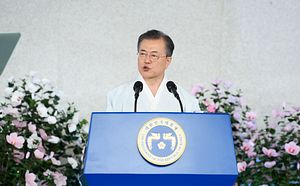Resolving the economic tensions between South Korea and Japan will not be easy, but South Korean President Moon Jae-in took an initial step by tempering his remarks on Japan during his annual address on Liberation Day, which marks South Korea’s independence from Japanese colonial rule.
It would have been easy for Moon to appeal to nationalist sentiments about Japan during his speech on August 15, but instead he left the door open for cooperation. In his remarks, Moon expressed his hope that Japan will play a leading role in East Asia’s peace and prosperity, while noting that Japan had benefited greatly from free trade and global supply chains. He said, “If Japan chooses the path of dialogue and cooperation, we will gladly join hands. We will strive with Japan to create an East Asia that engages in fair trade and cooperation.”
This is a marked change from Seoul’s initial response to Tokyo removing Seoul from its “white list” of trusted export partners. Seoul reciprocated in kind and Moon told the South Korean public that “We will never again lose to Japan.”
Despite his conciliatory tone this week, Moon did not shy away from the current conflict between the two nations, noting that when “any country weaponizes a sector where it has a comparative advantage, the peaceful free trade order will inevitably suffer damages.” He also reiterated his belief that in the long run an economically united Korean Peninsula can surpass Japan.
Moon’s olive branch also extended beyond the current economic conflict with Japan to North Korea policy and the Olympics. While some have suggested that Japan has not always been in sync with Seoul’s North Korea policy, Moon placed Japan’s efforts in a positive light, noting that “the United States is continuing dialogue with North Korea without derailing [the talks] while Japan is also seeking talks with Pyongyang.”
With some South Koreans calling for a boycott of the 2020 Tokyo Summer Olympics, Moon also expressed his hope for the Tokyo Games, saying that “Just as people around the world witnessed a ‘Peaceful Korean Peninsula’ at the PyeongChang Olympics, I look forward to seeing the Tokyo Olympics become a source of hope for friendship and cooperation.”
In expressing support for the Tokyo Games and Japan’s efforts to meet with North Korea, Moon may be trying to confine the current dispute to economic matters for the moment.
Whether Moon’s decision not to further escalate tensions with Japan will help to ease the current crisis, however, will depend on how Japan reacts to his speech and what South Korea chooses to do with its intelligence sharing agreement with Japan.
Since placing the initial export restrictions on three chemicals critical to South Korea’s electronics industry at the beginning of July, Japan has only approved one export license. If Japan begins to issue export licenses on a more regular basis, that will send a positive signal to South Korea.
At the same time, how South Korea handles its intelligence sharing agreement with Japan will also signal where the current dispute is going. Some in South Korea have suggested that it would not be appropriate to share intelligence with a country that has claimed it cannot trust Seoul. However, allowing the agreement to be renewed would reinforce what seem to be Moon’s efforts to confine the current standoff to economic issues.

































